The AI Advantage: How Data-Driven Engineering is Revolutionizing Civil Projects
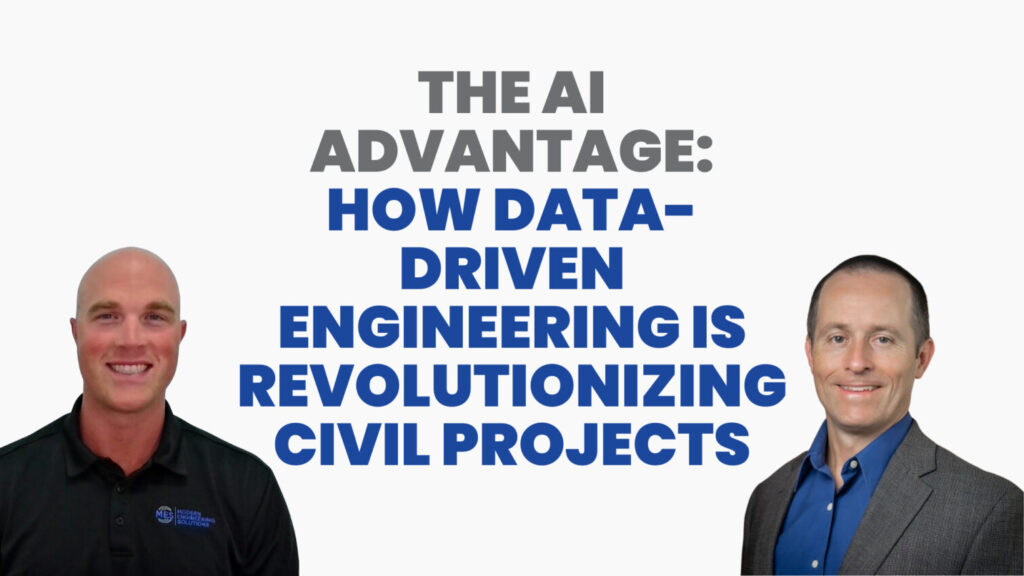
In the world of public utilities, there are three big things that matter: finding the right experts, being open and honest, and getting the money needed for the job. In this piece, we’ll look at how picking specialized contractors can save you money.
Webinar #1: Key Take Aways on How to Get Your Projects Approved Faster

In this episode of Engineers for Communities, we discussed how to improve communication with review agencies and streamline the approval process for your projects.
3 Lessons to Changing the Game in Public Utilities: Saving Money, Building Trust, and Getting Funding
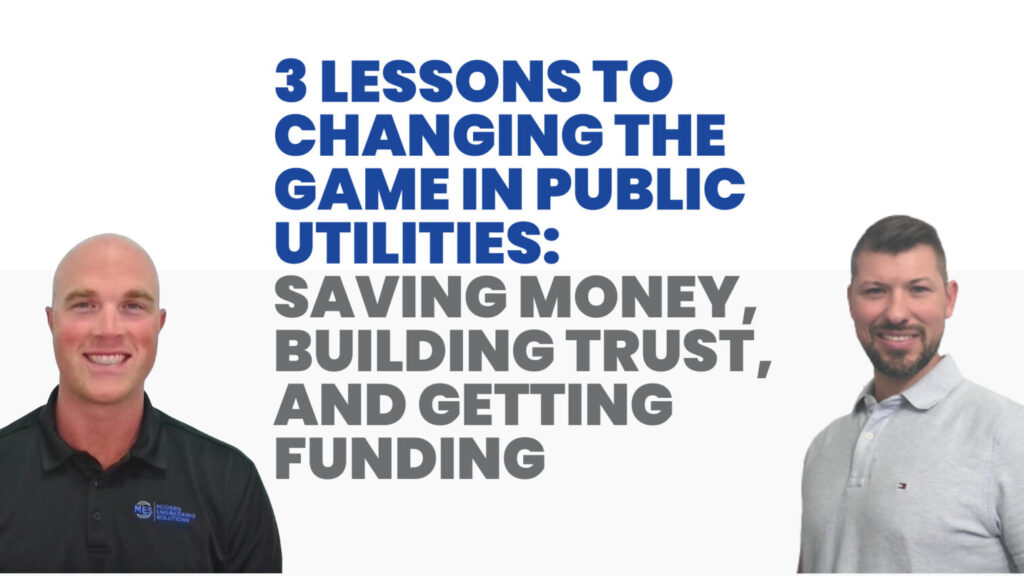
In the world of public utilities, there are three big things that matter: finding the right experts, being open and honest, and getting the money needed for the job. In this piece, we’ll look at how picking specialized contractors can save you money.
Why You Should Learn About the Lead Service Line Replacement Program
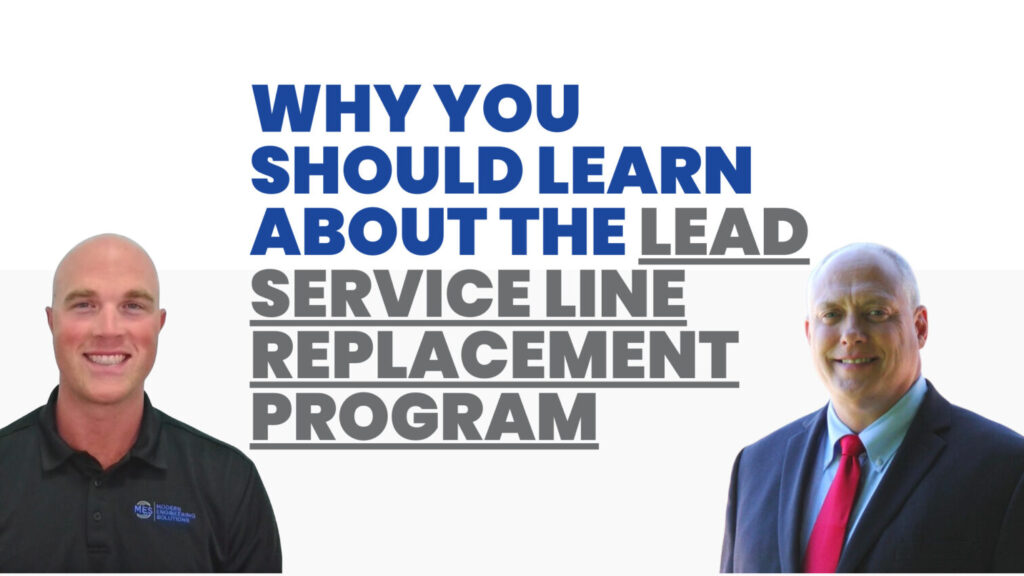
If you’re part of a rural Texas community with a water system built before 1980, we have some vital information that can greatly benefit you. In our recent Engineers for Communities live show, we were joined by Scott Galaway, Scott Galaway, an Outreach Specialist from the Texas Water Development Board (TWDB). Together, we explored the importance of the Lead Service Line Replacement Program, a groundbreaking initiative designed to help communities address the pressing issue of lead contamination in their water systems.
How You Can Revive a Bankrupted District and Build a New Wastewater Treatment Plant
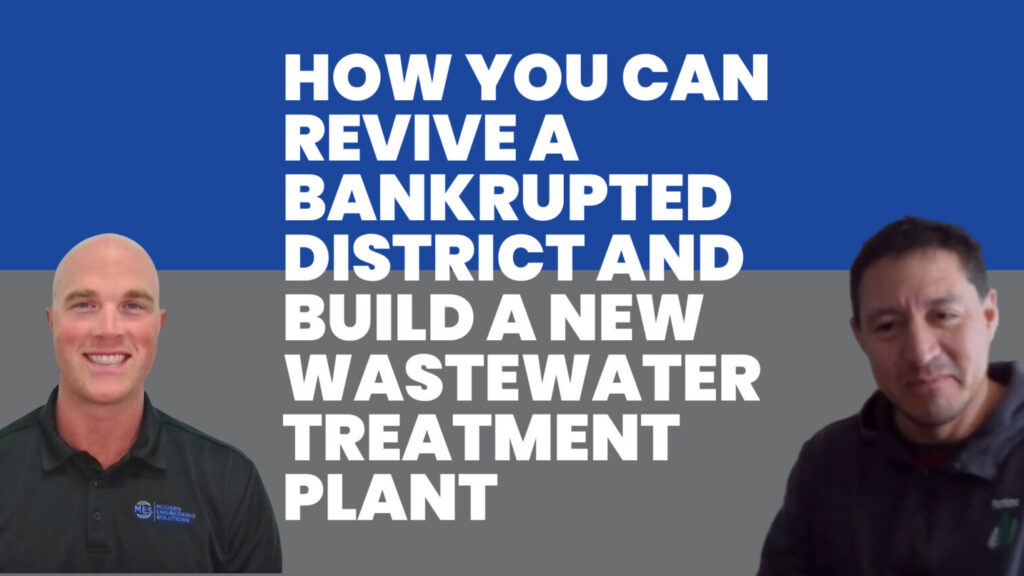
How You Can Revive a Bankrupted District and Build a New Wastewater Treatment Plant Discover how Geovanny Romero, District Manager at Morrison Creek Water and Sanitation District, revived a bankrupted district by overcoming financial and regulatory challenges to build a new wastewater treatment plant. Learn from his experience and understand the key strategies that can help you navigate complex hurdles and secure funding for your own wastewater projects. Lesson #1 Origins of Morrison Creek Water and Sanitation District Geovanny discusses the formation of the Morrison Creek Water and Sanitation District. The district was established in the early 1970s when a construction group, the Woodmore Corporation, began developing the area in anticipation of Colorado hosting the Winter Olympic Games. The group aimed to create Olympic Villages and towns to accommodate the influx of people and related activities. They purchased 11,000 acres of pristine Colorado mountain land, and the Morrison Creek Water and Sanitation District was created to serve these communities. Lesson #2: How Geovanny Overcame Challenges in Permitting a Wastewater Treatment Plant l asked Geovanny about the challenges faced during the construction of the new wastewater treatment plant. Geovanny explained that they had to comply with federal and state regulations and ensure the discharged water was clean as it flowed into a reservoir used for recreation. They had to overcome permitting challenges with the Colorado Department of Public Health and Environment (CDPHE). Geovanny shared that they had to conduct three different studies due to the unique requirements of discharging water into a lake. These studies included geological and archaeological requirements, as well as mixing zone studies carried out by a PhD expert. The mixing zone studies assessed how the effluent mixed under different seasonal conditions in the reservoir (summer, fall, and winter). The state requested an additional study in spring, but Geovanny hoped they would understand that more water flow during spring would result in better mixing and not require the additional study. Lesson #3 How Geovanny Overcame Challenges in Permitting a Wastewater Treatment Plant Geovanny discuss the financial challenges of a previously bankrupted district in funding a new wastewater treatment plant. Geovanny shares that he had to start from scratch, talking to various people, attending meetings, and reaching out to larger metro districts for advice. With the help of Adam Sommers at Aquaworks, Geovanny and his team applied for every grant they could find. By doing so, he gained a new perspective and a wealth of knowledge. Ultimately, they secured funding through the USDA, CDPHE, and the Colorado Department of Local Affairs of Local Affairs. The USDA financing, combined with a low-interest loan, covered the entire project cost. By obtaining these grants and loans, Geovanny effectively managed to pay for the project at 50 cents on the dollar, which significantly reduced the overall financial burden on the district. About Engineers for Communities We are here to allow smaller disadvantaged communities in Colorado, Texas, and other states connect on topics such as water, wastewater, city project planning, government funding, and everything in between. On the LIVE Engineers for Communities show, you’ll learn the hard-fought lessons from the front lines earned by various community leaders who have already had their teeth bashed in and lived to talk about it. We’ll share the tips, tricks, mindsets, and frameworks that allow great communities to preserve. Register to attend the live show, ask questions, and level up. It’s on selected Thursday starting at 12:00PM MT.
Top 3 Insights Gained from Taylor with Glacier
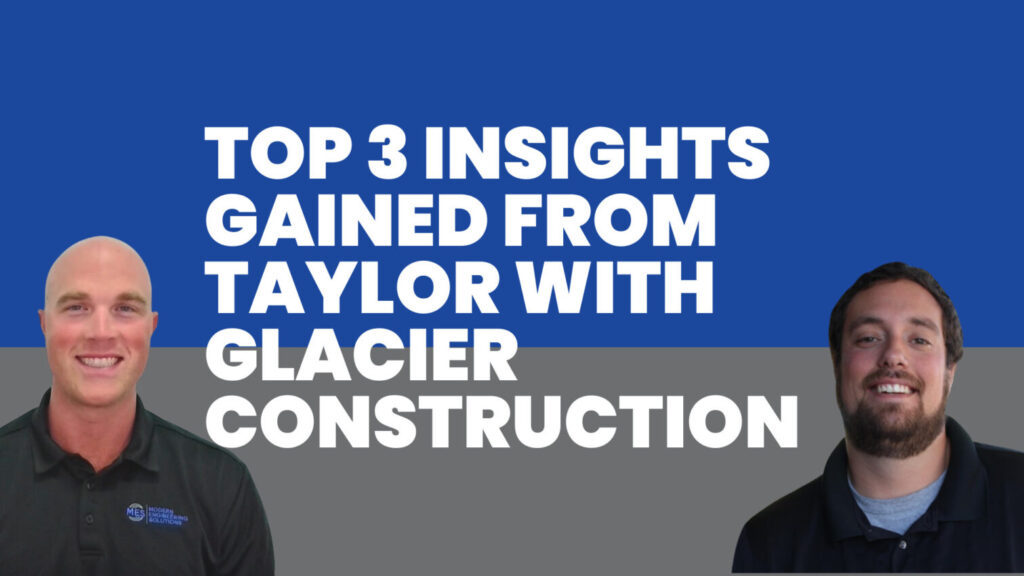
Top 3 Insights Gained from Taylor with Glacier I spoke with Taylor Pearson, Estimator at with Glacier Construction, who has leveled up much of rural Colorado with his unique skill set towards project management. Taylor has done an incredible job delivering water and wastewater projects across Colorado in a timely and professional manner. Taylor shared some incredible insights into their company’s success, approach to working with rural and disadvantaged communities, and recent accomplishments. In this blog post, we will highlight the top three things we learned from Taylor during the show. Lesson #1 Glacier Construction’s Secret Niche: Taylor from Glacier Construction revealed their company’s secret niche: focusing on rural and disadvantaged communities that often get overlooked by larger general contractors. Taylor explained that these communities need clean and distributed water just like everyone else, but they often lack the attention and resources of major metropolitan areas. Glacier Construction takes pride in working with small towns and rural communities, such as Cheraw and Eckley, where they have been involved in projects like filter skid replacement and water tower construction. This focus on rural areas sets them apart from other general contractors who prioritize larger, more high-profile projects. One of the most rewarding experiences Taylor shared was their involvement in a CMAR (Construction Manager at Risk) project in the town of Eckley. During a town hall meeting, Taylor and their team presented the project details and pricing to the community members. Seeing the residents’ excitement and gratitude for having someone invest in their community’s infrastructure was a heartwarming and fulfilling experience for Taylor and the entire Glacier Construction team. Lesson #2 Embracing Transparency and Trust as Core Values We discussed the core values of Glacier Construction, with a particular focus on transparency. Taylor explains that transparency is their number one belief, which helps build and maintain strong partnerships with engineers and owners they work with. While some contractors may avoid sharing detailed cost breakdowns to prevent clients from scrutinizing each line item, Glacier Construction takes a different approach. By adopting an open book policy and providing complete cost information, they build trust with their clients. Taylor believes this fosters long-term relationships and repeat business, which is crucial in their industry. This is a clear display of the importance of transparency in building trust and how it can work in a company’s favor, leading to clients becoming their biggest cheerleaders. Taylor emphasizes the significance of maintaining a good reputation in a small market, as a negative mark can have long-lasting consequences. Lesson #3 Understanding CMAR Projects and their Benefits We chat about CMAR (Construction Manager At Risk) projects and their benefits. Taylor explains that unlike traditional design-bid-build projects where the lowest bidder is usually awarded the project, CMAR projects involve a best value selection process. This includes considering factors such as the project team, approach, references, and preconstruction services fees. The CMAR process involves the contractor being selected at around 30-60% of the design stage, and they collaborate with the owner and engineer on design workshops and project kickoff meetings. Contractors can then provide more accurate cost estimates and contingencies, based on their expertise in actual construction costs. As the design progresses, the contractor submits open-book pricing with contingencies. This transparent process allows all parties to see where costs are coming from. Upon approval, preconstruction services are completed, and the project moves into the construction phase. One of the main advantages of CMAR projects is the ability to accelerate value engineering input and incorporate cost-saving measures during the design phase. Contractors can also suggest pre-procurement tactics for long lead items, potentially speeding up the project timeline compared to traditional design-bid-build projects. In summary, CMAR projects offer a more collaborative and transparent approach to project delivery, allowing contractors to provide valuable cost-saving insights and potentially accelerating the project timeline. About Engineers for Communities We are here to allow smaller disadvantaged communities in Colorado, Texas, and other states connect on topics such as water, wastewater, city project planning, government funding, and everything in between. On the LIVE Engineers for Communities show, you’ll learn the hard-fought lessons from the front lines earned by various community leaders who have already had their teeth bashed in and lived to talk about it. We’ll share the tips, tricks, mindsets, and frameworks that allow great communities to preserve. Register to attend the live show, ask questions, and level up. It’s every Thursday starting at 12:00PM MT.
Get Your Projects Approved Faster | Engineers For Communities Live Webinar | Episode 8 News
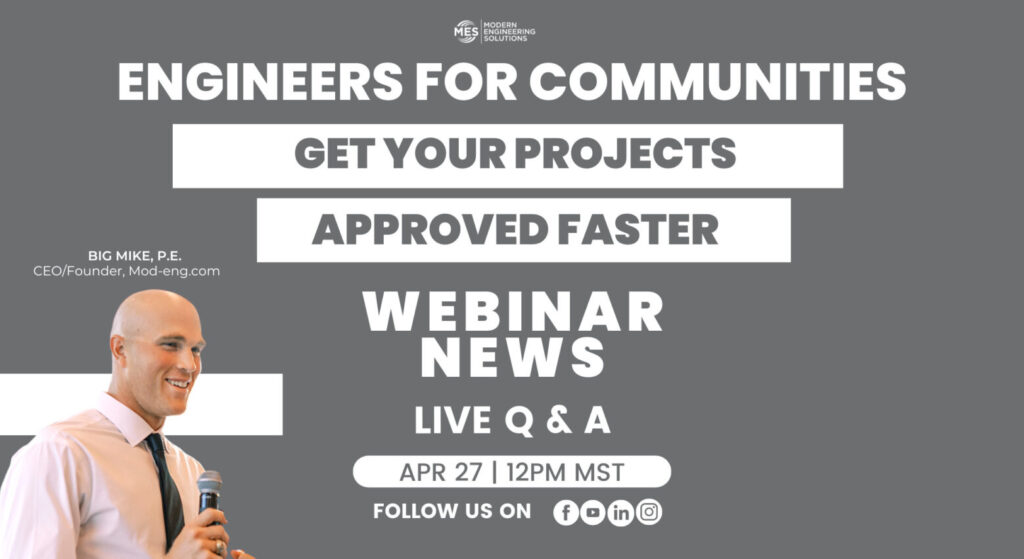
We’ll be delving into the power of video communication and Microsoft Teams to streamline project approvals, improve collaboration, and optimize efficiency.
Big Mike Ft.Christoper Martin | Engineers For Communities Live Show | Episode 7 News
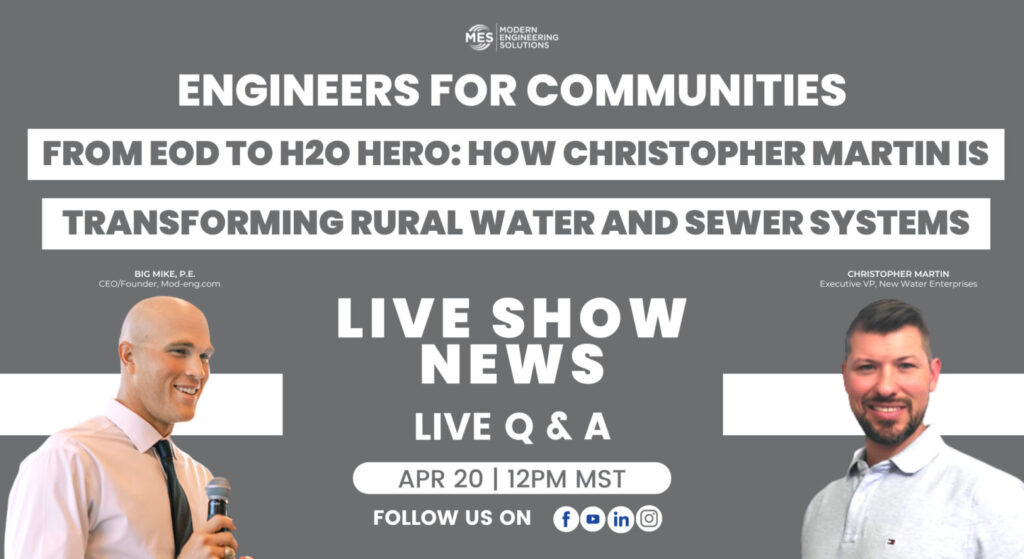
In this blog, we’ll dive into why Christopher started New Water Enterprises, the opportunities for rural water providers to improve their water tank maintenance, and the challenges he often encounters when working with these communities. We’ll also explore Christopher’s efforts to bring about change in rural Oklahoma and Texas and what water and sewer providers need to know about the grant system.
3 LESSONS I LEARNED FROM THE POWELL WATER TEAM ABOUT RURAL WASTEWATER TREATMENT
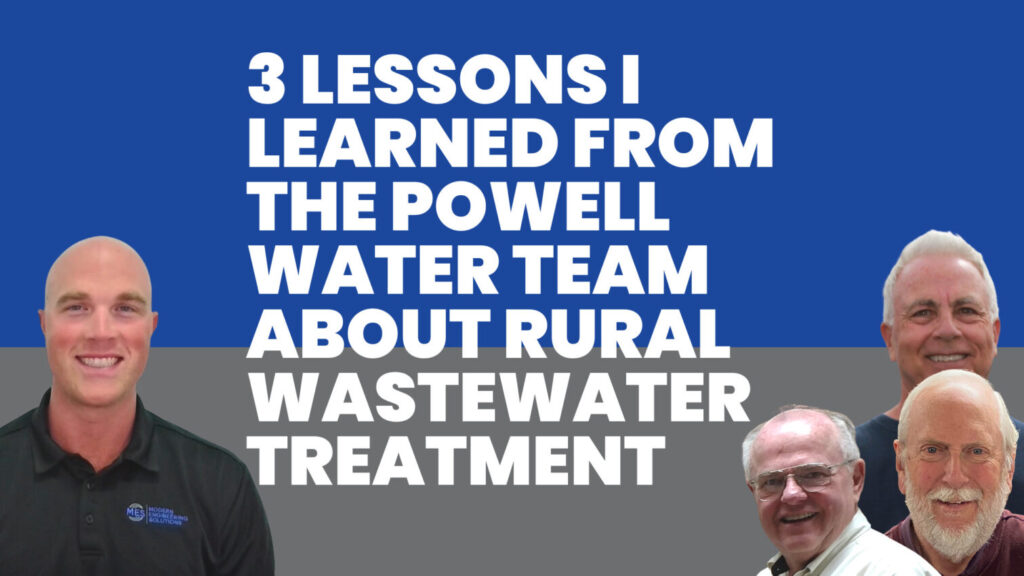
I spoke with Scott Powell, Judd Sundine, and Jeff Couch with Powell Water Systems, about the kind of impact they are having in communities around the US. Communities are now burdened with the task of coming into compliance by upgrading their treatment plans which can cost over 12 MILLION DOLLAR. When you live in a rural Colorado community of 200 people with an average household income of $45,000 per year this cost becomes a huge burden, BUT Powell Water may have a perfect solution for you.
Big Mike ft.Scott Galaway | Engineers For Communities Live Show | Episode 6 News
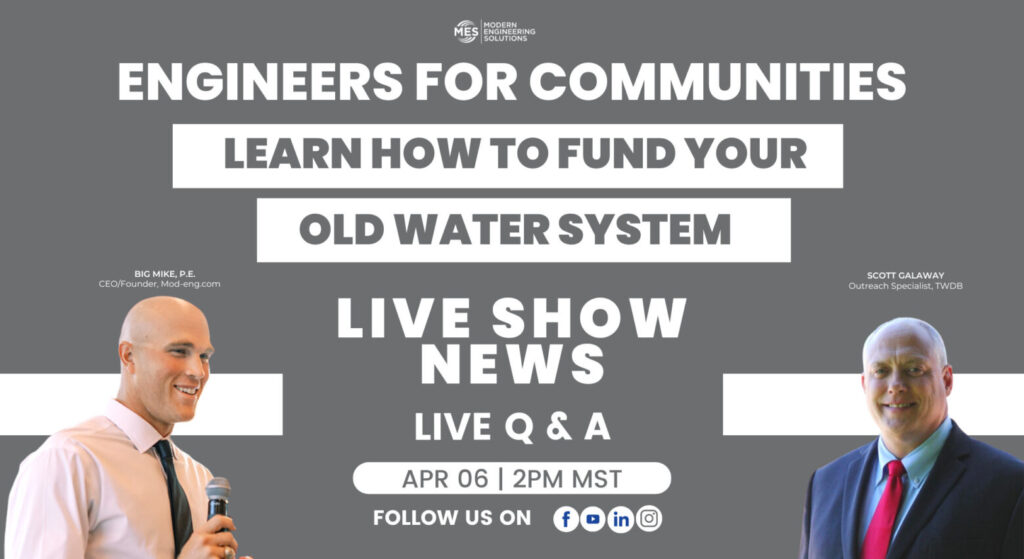
Are you a part of a rural Texas community with a water system built before 1980? If so, you’ll definitely want to tune in to our upcoming episode. In this informative and engaging show, we’ll be joined by Scott Galaway, an Outreach Specialist from the Texas Development Water Board (TWDB), who will be sharing valuable insights on the Lead Service Line Replacement Program.
3 Ways That Nathan Is Changing the Game of Developers in Colorado
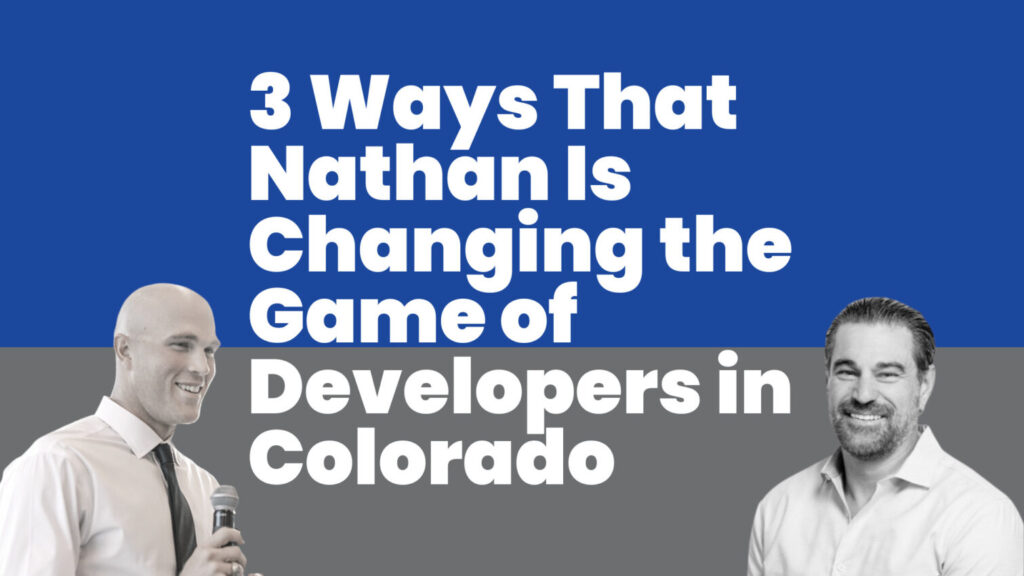
RedT just learned about LEED Zero certification 15 months ago. Upon learning there is a higher standard to hold new construction too redT decided it is time to up their game.
Big Mike Ft.Geovanny Romero | Engineers For Communities Live Show | Episode 5 News
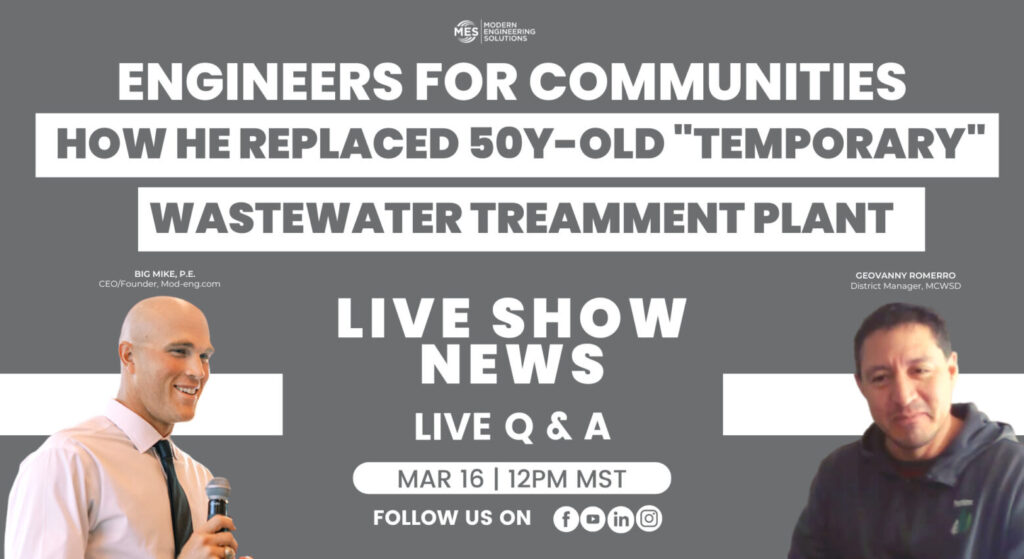
When you hear about development, you think destroying the environment, displacing wildlife, and high-density development BUT in the area around Stagecoach Reservoir in Routt County, Colorado has built something different. The Stagecoach Reservoir Area is among the most breathtaking places in all of Colorado.
Secrets From a Successful Project Manager Event News
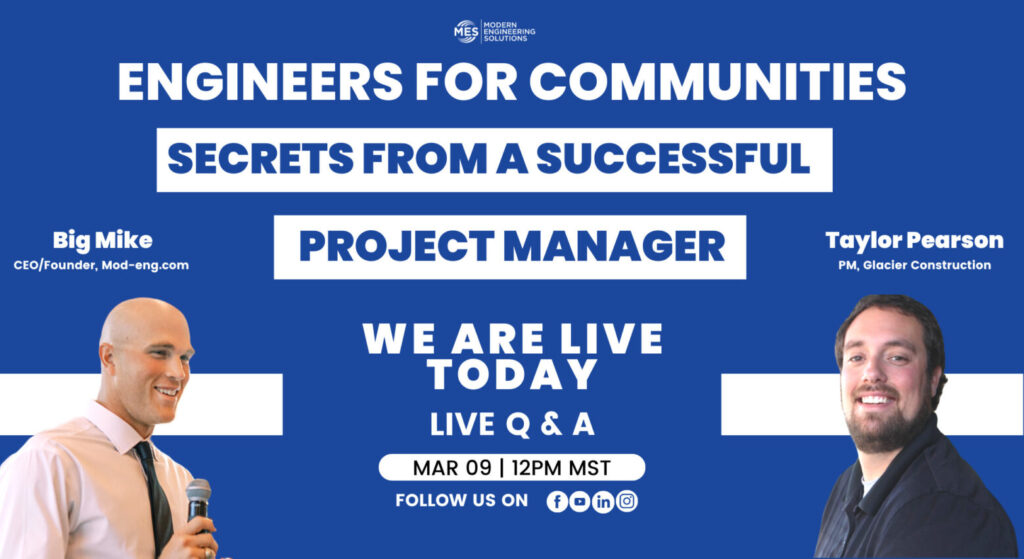
How Taylor Sets the Standard for Project Management Managing the complex nature of construction projects is not something you go to school for and are instantly ready to lead a project from start to finish. Taylor Pearson, a third-generation construction professional, is leveling up much of rural Colorado with his unique skill set towards project management. This is why I’ve asked Taylor with Glacier Construction to join us. Taylor is everything you want in your project manager: Skilled, proactive, friendly, and personable. Taylor will highlight the following topics that are guaranteed to be beneficial to everyone: His journey to become a third-generation construction professional. Frustrated developer story How and what Glacier Construction’s secrete niche is. About Us – Safety First Values TRANSPARENCY RELIABILITY UNLOCKING VALUE SUPERIOR QUALITY TEAM FOCUSED Why Taylor loves working with rural and disadvantaged communities. Why communities are asking Glacier Construction to bid their projects. What is a CMAR project? Taylor’s and Glacier Construction’s recent WINS. This week’s episode will be a fun conversation filled with practical and unique insights. Don’t miss the Engineers for Communities Live Show this Thursday at 12:00 PM MT, where you can participate live and benefit from Taylor’s insights!
This Technology is Saving Communities Millions Event Onboarding Talking Points
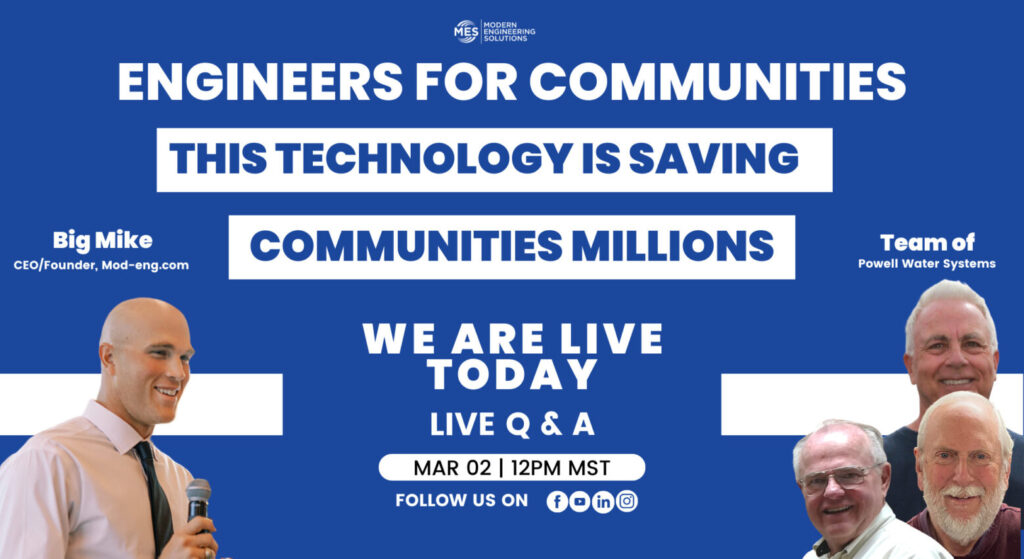
How Powell Water is Creating Cost Effective Wastewater Treatment Plant Solutions Throughout Colorado regulations for the effluent of wastewater treatment plants become more and more strict over time. Communities are now burdened with the task of coming into compliance by upgrading their treatment plans which can cost over 12 MILLION DOLLAR. When you live in a rural Colorado community of 200 people with an average household income of $45,000 per year this cost becomes a huge burden, BUT Powell Water may have a perfect solution for you. This is why I’ve asked the Powell Water Systems Team of Scott, Jeff, and Judd to join us. Powell Water designs modify existing lagoons with a mixture of electrocoagulation and microalgae to meet the strict effluent limits in Colorado. As you will find out during the show the potential for cost savings is astronomical. Powell Water Systems Team will highlight the following topics that are guaranteed to be beneficial to everyone: The history and formation of Powell Water What is electrocoagulation and microalgae? Electrocoagulation Vs. chemical coagulation Cost Savings versus mechanical plants Installing Powell Water’s system in new communities This week’s episode will be a fun conversation filled with practical and unique insights. Don’t miss the Engineers For Communities Live Show this Thursday at 12:00 PM MST, where you can participate live and benefit from the team’s insights!
3 Things You Should Know About Colorado Water and Sewers Providers
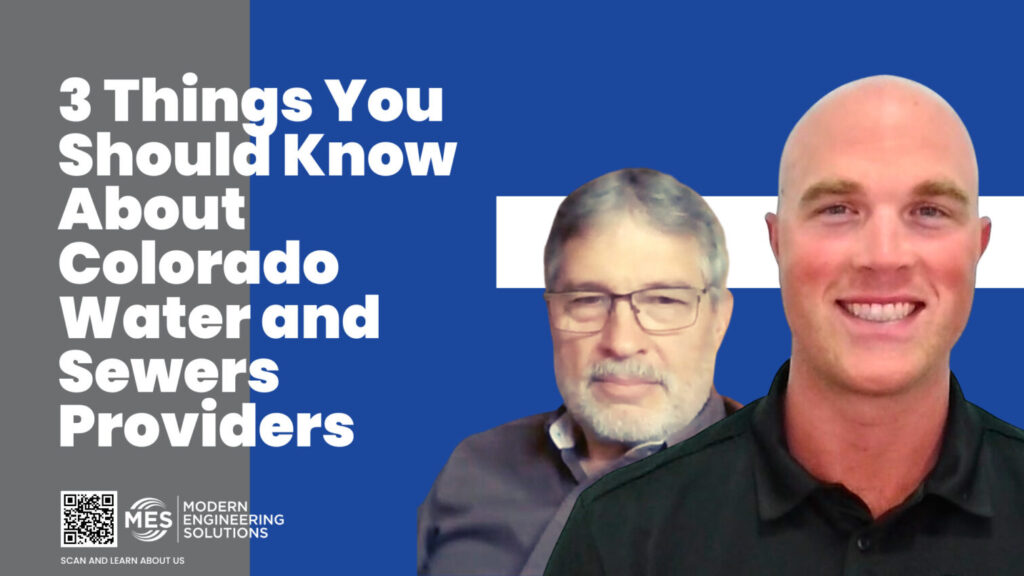
We are here to allow smaller disadvantaged communities in Colorado and other states to connect on topics such as water, wastewater, city project planning, government funding, and everything in between.
Building A Greener Colorado Event News

How this developer is cleaning up Colorado for you When you hear the phrase “developer” you think of money grubbing and self-interested, BUT redT Homes, a Denver Based Residential Real Estate Development Company, is changing that definition fast. This is why I’ve asked Nathan Adams, Owner and CEO of RedT_Homes, to join us. redT’s mission of “BUILDING A GREENER COLORADO” is giving the people of the greater Denver area what they want, cleaner, healthy, attainably priced homes. redT is the first homebuilder west of the Mississippi to develop new construction homes to the rigorous USGBC standards to meet LEED Zero Certification Nathan will highlight the following topics that are guaranteed to be beneficial to everyone: Where did “Building a Greener Colorado” start? What is LEED certification and how do we hit LEED Zero? Why are projects taking so long to get approved and what can we do to change that? Update on the Denver Housing Crisis Will redT stop at only building a greener Colorado? Tomorrow’s episode will be a fun conversation filled with practical and unique insights. Don’t miss the Engineers for Communities Live Show this Thursday at 12:00 PM MT, where you can participate live and benefit from Nathan’s insights!
He Saved $8M With a 5 Min Google Search Event News
How you can find practical solutions hidden in plain sight Many Colorado Rural Water and Sanitation providers face enormous problems that most people don’t know about AND most providers have no funding sources available to address these problems. However, solutions do exist. Enter David Schneider, who, with his blue-collar mentality, has changed the game. David is the Owner and Founder of Wet Valley Water Consultants and District Manager of the Round Mountain Water and Sanitation District. David’s “boots on the ground and roll up your sleeves” mentality has uncovered unique solutions for many of the challenging issues facing rural Colorado Water & Sanitation providers. In our upcoming show, David will highlight the following topics that are guaranteed to be beneficial to everyone: How a 5 minute google search and a phone call saved a disadvantaged community 8 MILLION DOLLARS A $2 Million “Out of the Box” Solution at NO NET COST The next big earthquake in the Rural Colorado Water and Wastewater industry Significant problems with current engineering solutions for rural water and wastewater challenges The BIGGEST challenges rural water and wastewater providers face and how David has worked around them. Three unique solutions for funding water and wastewater project through various grant and loan programs. This week’s episode will be a fun conversation filled with practical and unique insights. Don’t miss the Engineers for Communities Live Show this Thursday at 12:00 PM MT, where you can participate live and benefit from David’s insights! Watch on Facebook and Linkedin
